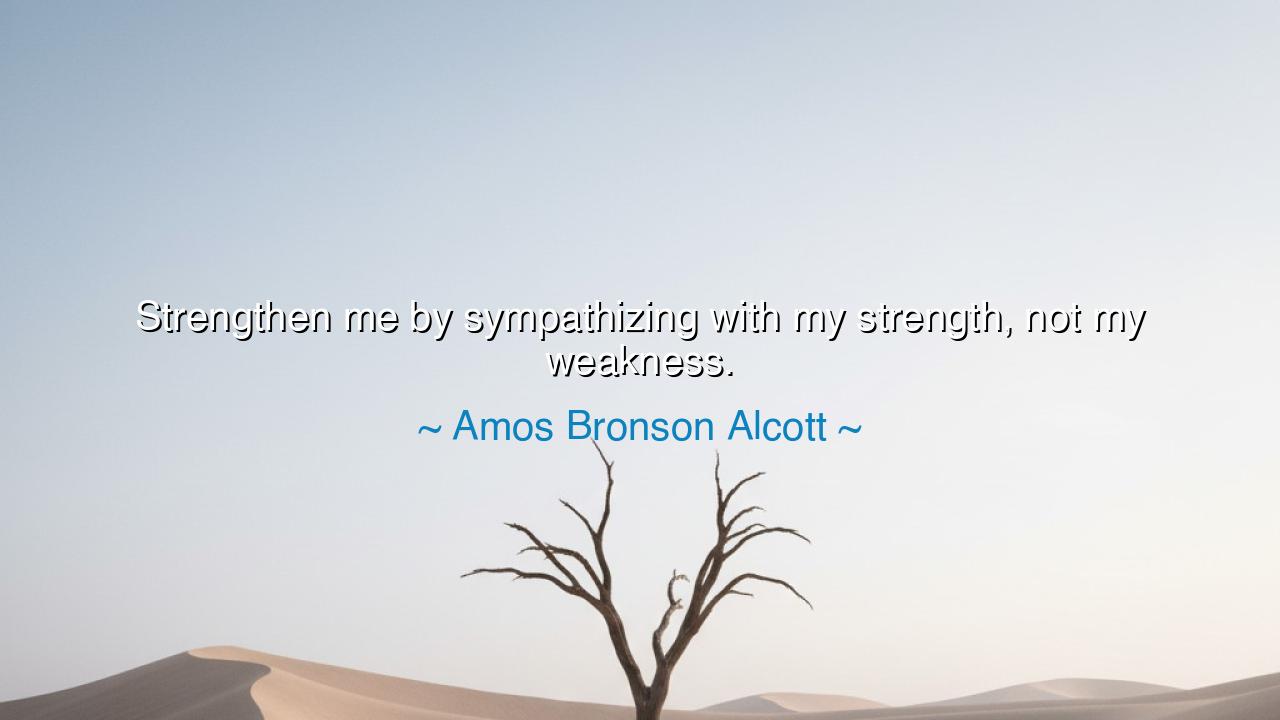
Strengthen me by sympathizing with my strength, not my weakness.






Amos Bronson Alcott, the philosopher and reformer, once spoke with the piercing clarity of one who understood the secret springs of human nature: “Strengthen me by sympathizing with my strength, not my weakness.” These words strike against the false kindness of pity, that soft indulgence which feeds frailty rather than fortitude. Alcott calls instead for a higher form of sympathy—one that looks not to the broken places in a soul, but to the pillars that yet stand, and from them builds even greater strength. For a man becomes what others affirm in him: if they affirm his weakness, he remains weak; if they affirm his strength, he grows mighty.
The ancients, too, knew this truth. In the schools of Sparta, children were not pitied for their hardships, but praised for their endurance. When they faltered, they were not coddled, but reminded of their courage, their discipline, their birthright as warriors. Thus their strength grew until it overshadowed their weakness. So also Alcott’s words remind us: true sympathy is not to dwell on wounds, but to call forth the lion that still sleeps within. To sympathize with strength is to summon strength.
Consider the story of Helen Keller and her teacher, Anne Sullivan. Helen, blind and deaf, could have been smothered by pity, trapped forever in weakness. But Anne did not dwell on what Helen lacked. She affirmed what she possessed: her fierce intelligence, her determination, her hunger to know. By sympathizing with her strength, Anne called it forth until Helen became a writer, a speaker, and a symbol of human triumph. Had she been pitied for her weakness, she might have remained imprisoned by it.
Weakness, when coddled, becomes a chain. Strength, when affirmed, becomes wings. Think of Winston Churchill in the darkest days of the Blitz. The people of Britain might have begged for comfort in their fear. Instead, Churchill gave them strength, reminding them of their courage, their history, their unbreakable will. He did not sympathize with their terror—he sympathized with their bravery. And so, their strength was magnified, and they endured fire and ruin without surrender.
The truth is this: to sympathize with weakness is to keep a man in the dust; to sympathize with strength is to lift him to the stars. Every human soul carries both—the fragile and the unyielding. Which side will grow depends often on what others choose to affirm. If you would strengthen someone, speak not to their fear but to their courage; not to their despair but to their hope; not to their failure but to their capacity for triumph.
The lesson, then, is clear: when you love another, do not chain them with pity. Lift them with faith. See their strength even when they cannot see it themselves. Remind them of their victories, their resilience, their unyielding core. In doing so, you not only strengthen them—you call forth greatness. Alcott’s wisdom is a charge to all teachers, parents, friends, and leaders: train your eyes to see the strength in others, and let your words awaken it.
Practical action follows: When you meet someone in sorrow, do not only weep with them—remind them of their strength. When a friend fails, acknowledge their pain, but then call them back to their power. Speak words that affirm courage, endurance, and capacity. Practice this also with yourself: do not brood on your weakness, but dwell on your victories, however small. Each time you affirm strength, it grows. In this way, you will live the wisdom of Amos Bronson Alcott: to strengthen others by sympathizing with their strength, not their weakness.






AAdministratorAdministrator
Welcome, honored guests. Please leave a comment, we will respond soon